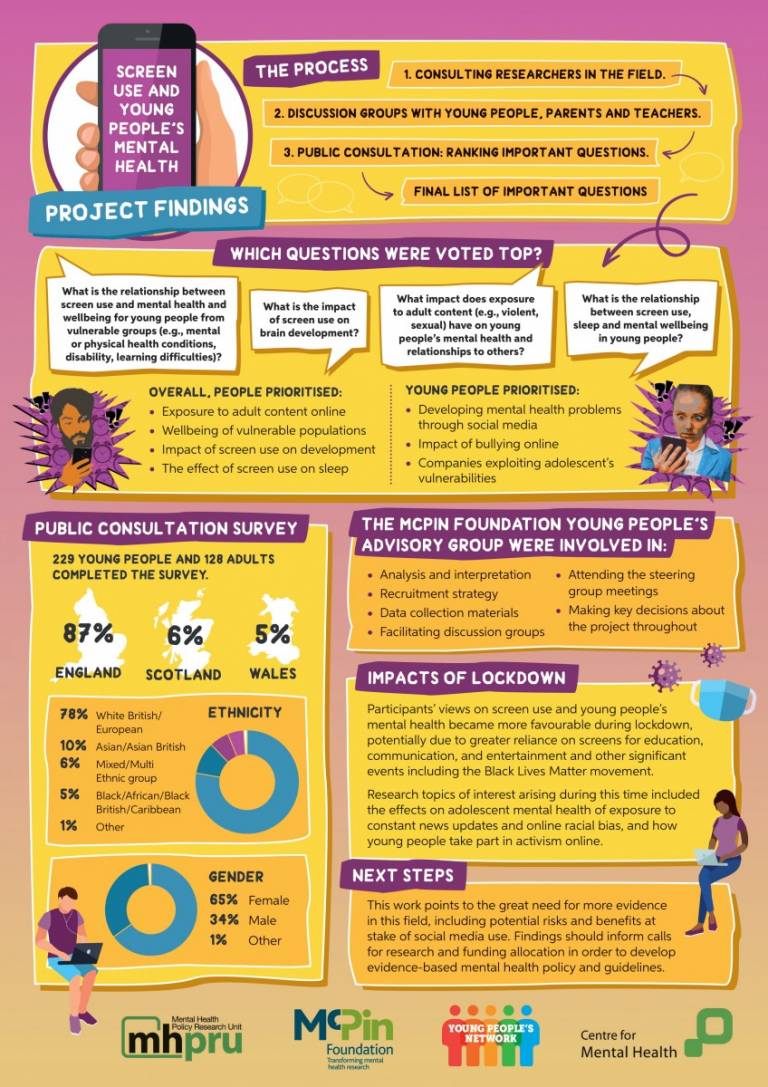[Project status – Ongoing]
Project Summary
To develop meaningful evidence-based policy guidelines, a crucial first step is to ensure the right research questions are being asked. This project aimed to identify the most important and unanswered research questions about screen use and adolescent mental health from the perspective of young people, their parents and educators. Findings from this research will help shape future research and policy guidelines that will benefit young people in the future.
The study design was informed by the James Lind Alliance Priority Setting Partnership approach. There were three main steps to achieve the study aim:
- A consultation survey and interviews with experts in the field of screen use and adolescent mental health.
- Participatory discussion groups with young people (11-25 years old), parents and teachers.
- A list of research questions developed based on the latter two inquiries. This list was circulated in a public consultation survey for young people, parents and teachers to identify their top 10 research priorities on screen use and adolescent mental health.
This project was conducted in collaboration with McPin Foundation and the Centre for Mental Health. Research was guided by a steering group comprising researchers, third sector partners, clinicians, parents/carers and young people. A Young People's Advisory Group contributed at each stage.
Consensus was reached for the prioritization of four topics for future research: (i) the impact of exposure to adult content on young people's mental health and relationships; (ii) the relationship between screen use and the well-being of young people from vulnerable groups; (iii) the impact of screen use on brain development; and (iv) the relationship between screen use and sleep.
Additionally, young participants prioritized questions about online bullying, advertisements targeting young people, and the relationship between social media and specific mental health conditions. Research topics of interest arising specifically during the pandemic included the effects on adolescent mental health of exposure to constant news updates and online racial bias, and how young people take part in activism online.
PPI: Members of the MH PRU Lived Experience Working Group (LEWG) and Lived Experience Advisory Network (LEAN) are members of the project working group.
Engagement and Events
- Blog: When it comes to youth mental health, let’s focus on screen-use not screen-time by The Mental Elf
- Blog: This blog summarises the involvement of the McPin charity in this study.
- Blog: This report from our partners Centre for Mental Health provides a great summary of findings of this study. It also includes an excellent video from one of the peer researchers involved.
- QUAHRC Methods Podcast: This podcast focuses on the co-production, with members of our team with different perspectives exploring the co-production process.
- Blog: This further McPin report discusses reasons for young people to get involved in mental health research. -

Publications
Priorities for future research about screen use and adolescent mental health: A participatory prioritization study: This paper provides a full report of the research priorities emerging from this study and the process used to arrive at them.
 Close
Close

